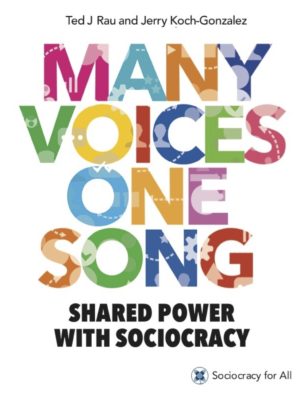I sat in on a conference call with the SociocraticConsultingGroup-en last week on forming an organization for sociocracy. I found the discussion to be about the same issues we had several years ago, when Socionet tried to form. It’s the same problem that the NVC organization has had, and that the Austin Belly dance group discussed on the [email protected] list many years ago. The problem of conflicting aims and energies between professionals and enthusiasts.
The problem appears when trying to build an organization that can’t decide if it is promoting sociocracy for all or promoting professional consultants. The energy now is largely in the consultants. This is because the people who most see the need and opportunity often are consultants already or become consultants. That’s good because they can train people who will be most likely to apply the method in their organizationsThe Delibrative Democracy Consortium (DDC)u is an alliance o....
A Peer-to-Peer Sociocratic Movement
I’ve never seen mixing of professionals and enthusiasts work in one organization to serve everyone’s needs. It can’t be built around classes, mostly because enthusiasts and sociocrats don’t want to join an organization in order to be marketed to. But it is also because professionals have different needs. They need to ask questions at a more complex level than people who are just learning about sociocracy. They need to discuss professional issues relating to the implementation in situations that they may need to discuss confidentially. They need to ask questions related to building their practices as sociocratic professionals.
The general population may want classes but they also want peer-to-peer interactions and information in a different form. Written materials and tapes. DVDs. Ideas and experiences to discuss with each other, not in teacher-student interactions. Enthusiasts will pull away from professionals and professionals pull away from them.
Ironically, the sociocratic organization has not managed to produce equality in sociocracy.
Discouraging a Sociocratic Movement
The global organization has been supremely afraid of letting the method go viral and still has not released its norms. The fear is that the method will be badly applied by anyone except certified experts and thus reflect negatively on sociocracy.
Professionals have also not encouraged a movement of enthusiasts to form. One negative reaction from professionals to people seeking information and association as other than clients is that such people are asking them to work free. That kind of attitude will dampen any movement. A movement needs the support of experts, but enthusiasts want to join an organization of equals who share information and experiences freely.
What Associations Do
Associations are usually non-profit, dedicated to charitable and public service purposes. They form around a purpose and draw members in to help them accomplish their purpose. They may maintain a speakers bureau that will speak anywhere for low or now cost. They distribute flyers to the public at no cost. Generate books and other materials that can be purchased. Members receive benefits to encourage them to further the purpose, usually a discount on publications, invitations to meetings of various kinds, and a newsletter.
Public Dissemination of Ideas
Business people and government officials have informal groups that meet for lunch and have a speaker. Sometimes the speakers receive an honorarium and sometimes only a free lunch. If the roundtable is for business people, sometimes a gift or gift certificate donated by one of the members. These are networking lunches of highly committed and ambitious people.
How many people have been prepared to speak at such a gathering about sociocracy? What resources are available to help them do so? Outlines and public speaking guides.
When Tony Robbins was beginning his career, he spoke anywhere. Other speakers would only speak to certain groups or if they were paid. Because Robbins accepted any request he spoke several times a week. He was able to hone his message and understand his audience. This is one thing that Malcolm Gladwell discusses in The Tipping Point: that success depends on the frequency of performing, speaking, running, etc., usually from a young age.
Bill Gates had access as a teenager to computers and programming. Access others didn’t have. The Beatles were performing on a circuit for years before they became famous. When Tony Robbins developed his motivational speaking skills, he was working as a janitor and , if I remember correctly, took the opportunity to discuss ideas with the executives whose office he cleaned.
Leadership
Movements also need leaders. Extroverts who love talking to people and being out front. The skills that make good politicians. I don’t think such a person has surfaced in the sociocratic community. Possibly because such a person doesn’t fit in with the global organization which is fairly rigid and closed. The new website is a huge step forward but has been years in the making. The current version has been under consideration for over a year.
While a leader needs to understand the method, the requirement that they be certified is counter-productive and anti-movement unless the purpose is to organize certified people.
A sociocratic movement will not be successful until the needs of professionals as consultants are separated from those of enthusiasts and practitioners, and a leader emerges.
Categories: Collaborative Organizations

